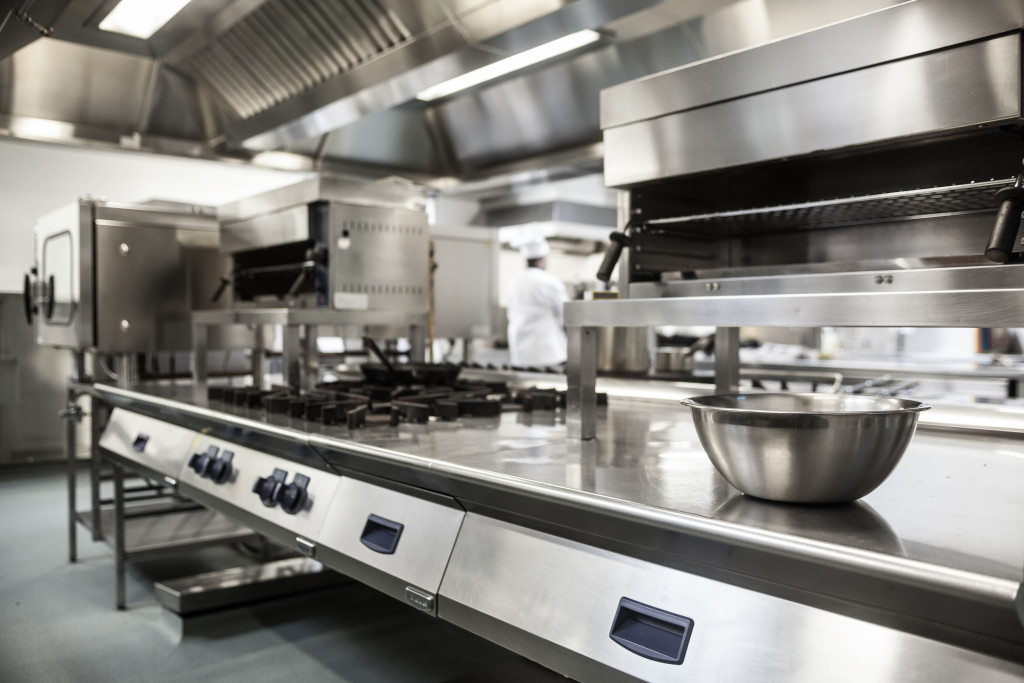- Regular maintenance checks, including cleaning cooking equipment and floors and disinfecting work surfaces, are crucial for maintaining a hygienic restaurant kitchen.
- Proper waste disposal and recycling practices are fundamental to keep the kitchen clean and prevent health hazards.
- Keeping the refrigerator clean and organized is key to ensuring food safety and reducing waste.
- Maintaining a clean and efficient kitchen is not only a necessity but a key factor in the success of your restaurant business.
Running a successful restaurant requires more than just serving delicious food – maintaining a clean and hygienic kitchen is equally crucial. You might wonder, “How can I keep my restaurant kitchen spotless and efficient?”
Well, from regular deep cleaning to proper storage and training your staff in food safety, there are efficient ways to ensure cleanliness that would keep your kitchen in shape and ready for service at all times. This article will dive into these methods in detail to help you uphold the highest standards of cleanliness in your restaurant kitchen.
Regular Maintenance Checks
Regular maintenance checks form the backbone of any clean and efficient restaurant kitchen, ensuring all equipment functions optimally and maintaining hygiene standards. Here are some tips:
Regularly Clean Cooking Equipment

Cleaning your cooking equipment regularly is more than just about maintaining appearances. It’s an integral part of guaranteeing food safety and extending the lifespan of your appliances. From your grills, ovens, and fryers to your blenders and mixers, each piece of equipment should have a cleaning schedule based on how often it’s used.
Appliances used daily, like grills and ovens, need to be cleaned thoroughly every night to prevent food buildup and potential bacterial growth. Less frequently used appliances, like mixers, can be on a weekly cleaning schedule.
Always follow the manufacturer’s instructions to ensure effective cleaning without damaging your equipment. Ensuring a well-maintained kitchen promotes a safe and healthy environment for your staff and can also increase efficiency and productivity by preventing equipment breakdowns.
Clean the Floors Daily
Cleaning the floors daily is essential for maintaining a clean restaurant kitchen. Floors in such environments are prone to spilled food, grease, and sticky liquids, which, if not cleaned daily, can become a breeding ground for bacteria, insects, and rodents. Moreover, this buildup can also pose a safety hazard, leading to potential slips and falls.
Therefore, the floors should be swept throughout the day to remove loose debris and mopped thoroughly at the end of each working day using a disinfectant cleaner. Special attention should be given to areas underneath the equipment and hard-to-reach corners.
Utilizing mats in high-traffic areas can also help catch spills and debris, but these mats must be cleaned regularly. Maintaining clean floors is not just about hygiene; it contributes to your kitchen’s safety and efficiency.
Regularly Disinfect Work Surfaces
Regular disinfection of work surfaces is an essential part of kitchen hygiene. Work surfaces include counters, cutting boards, and prep stations that come in direct contact with food. These areas are hotbeds for cross-contamination if not properly cleaned, potentially leading to foodborne illnesses.
It’s critical to clean these surfaces throughout the day, especially between different tasks. After cleaning with warm, soapy water, you should use a food-safe disinfectant to kill lingering bacteria. Using color-coded cutting boards is also beneficial to prevent cross-contamination between different foods, like raw meat and vegetables.
In essence, regular disinfection contributes to food safety and extends the lifespan of your work surfaces. Therefore, ensure your kitchen staff understands and adheres to these cleaning practices as part of their daily routine.
Proper Waste Disposal

Proper waste disposal is fundamental to maintaining cleanliness and efficiency in a restaurant kitchen. Waste can become a health hazard and attract pests if not disposed of correctly. All waste should be discarded in a designated bin with a lid to prevent odors and pests.
It’s important to remove trash from the kitchen area frequently, ideally after each meal period, and the trash bins should be cleaned and disinfected regularly. Additionally, consider implementing a recycling system for cardboard, glass, and certain plastics. Another option to consider is composting organic waste.
This practice helps reduce the amount of waste sent to landfills and provides a valuable resource for enriching soil in local community gardens. Cultivating a sustainability mindset among your staff can also lead to innovative methods of reducing waste, such as repurposing food scraps where possible.
Keep the Refrigerator Clean and Organized
Maintaining a clean and organized refrigerator is key to running an efficient and hygienic restaurant kitchen. This involves regularly checking the fridge for expired or spoiled items and disposing of them immediately. All items should be stored in appropriate containers or sealed plastic bags to prevent cross-contamination.
It’s crucial to adhere to the “first in, first out” principle to ensure that older stock is used before newer stock. The fridge should be cleaned weekly with warm water and baking soda to prevent odors and bacterial growth.
Temperature checks should also be done regularly to ensure it’s operating at the optimal temperature, usually between 33°F and 40°F (0.5°C to 4.4°C). Keeping your refrigerator clean and organized ensures food safety and helps reduce waste, save costs, and enhance kitchen efficiency.
Invest in a Commercial Kitchen Dishwasher
A commercial kitchen dishwasher is vital for any restaurant kitchen, aiming for impeccable cleanliness and efficiency. These high-capacity machines ensure a constant supply of clean, sanitized dishware, reducing the risk of cross-contamination. They operate at high temperatures, effectively killing bacteria and other pathogens, which traditional hand washing might miss.
Moreover, they significantly reduce the time and labor involved in dishwashing, allowing your staff to focus more on cooking and serving. With various options available, from under-counter models for small kitchens to conveyor models for larger establishments, you can choose a dishwasher that best fits your kitchen’s needs.
Remember, although the upfront cost might seem substantial, the long-term benefits of investing in a commercial dishwasher, in terms of hygiene, efficiency, and time-saving, far outweigh the initial expense.
Keeping your restaurant kitchen clean and efficient isn’t just necessary – it’s the key to your business’s success. So, embark on this cleanliness journey today and experience the remarkable transformation in your kitchen’s performance and your restaurant’s reputation. Take the first step towards a cleaner, healthier, and more efficient kitchen now!
